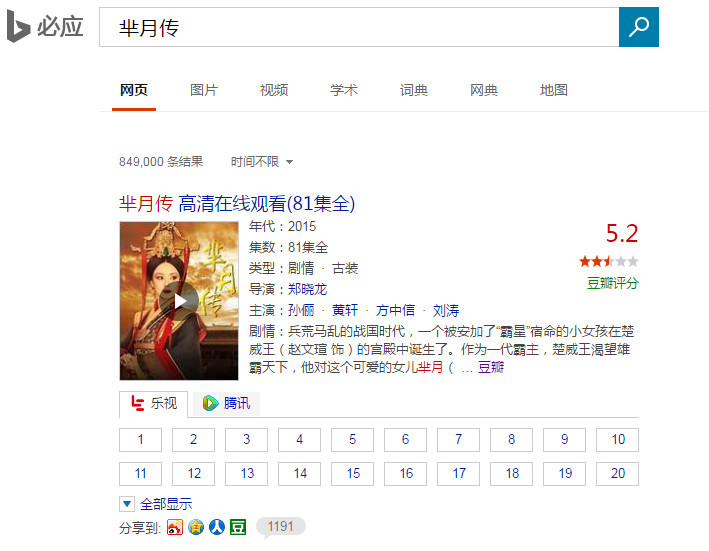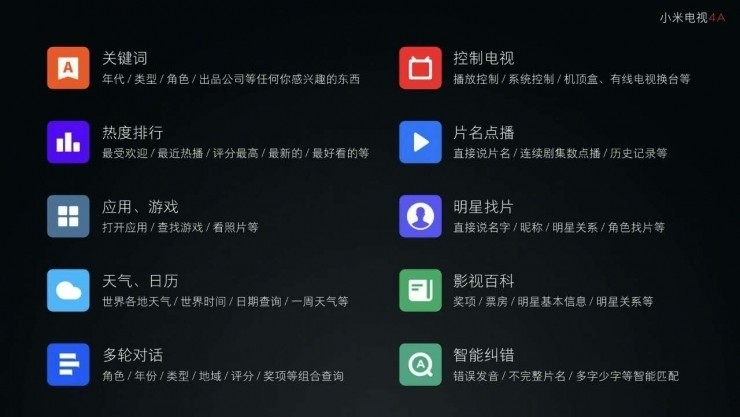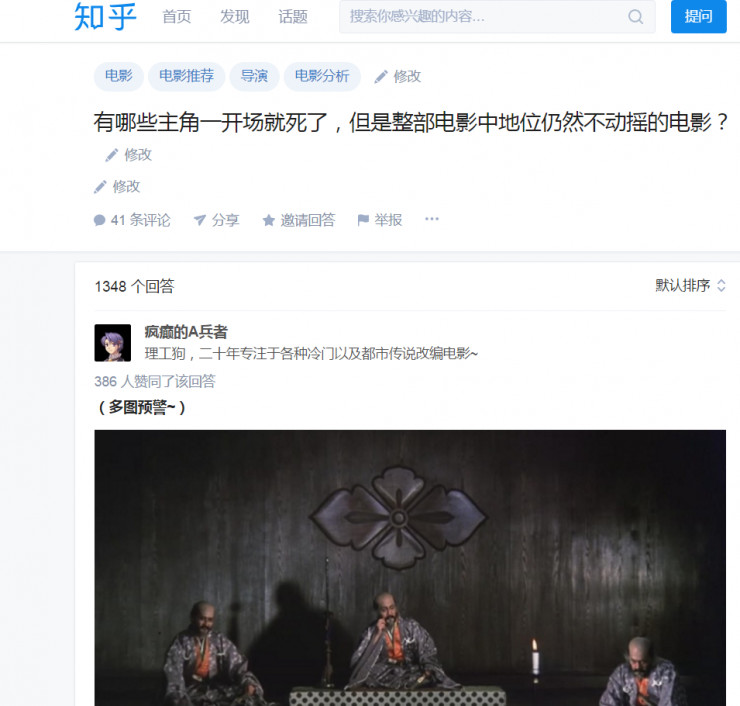OFweek Smart Home Network News: Last month, Xiaomi released a new TV - Xiaomi TV 4A. This press conference was only two months away from the launch of Xiaomi TV 4. The launch of Xiaomi TV 4A has a small background. Starting from the second half of last year, because of the sharp rise in raw material prices, in February, millet TV 3s has already increased its price by 500-600 yuan. The newly released millet TV 4 has not yet been listed for sale. However, the thickness of 4.9mm and the ultra-narrow frame doomed it not to be a "millet" product in price.
Millet TV 4A is known as a return to cost-effective, but at the same time, Wang Chuan also brought a new feature of this TV - artificial intelligence, which is "the first millet artificial intelligence voice TV." At the press conference, Wang Chuan’s demonstration won applause from the audience, especially when he spoke of instructions such as “The picture of Xiao Yue Yue’s chase†and “Deng Chao and Zhang Tianai’s meeting scene for the first timeâ€. Xiaomi TV 4A accurately jumped to When the corresponding screen.
Behind these amazing intelligences is the need for voice recognition and natural language processing. The Triangle Beast is the company that provides semantic understanding technology for Xiaomi TV. A few days ago, Lei Feng interviewed Chen Huarong, a triangular animal technology partner who was responsible for this project, to chat about his professional experience, the secret behind the artificial intelligence of Xiaomi TV 4A, and the commercial application of semantic understanding in the vertical field.

Triangle Huan Technology Partner Chen Huarong
Chen Huarong: Chat Robot from Bing's Answer System to Triangle Beast
In 2005, after receiving a master's degree in computer software and theory from the Chinese Academy of Sciences Software Institute, Chen Huarong joined Microsoft and worked in Beijing and Microsoft's headquarters in Seattle. In 2013, he returned to Beijing and was responsible for the Answer system of China, Japan and South Korea in the Bing department. The so-called Answer system provides users with structured display results. Users can obtain the required information without leaving the search engine.

As shown above, when you search for "Yueyue Biography", the first search result will directly show the TV drama information, posters, brief introductions and video links for each episode, and it comes from two different video websites. Baidu and Google also have similar systems, which are usually presented to users in the form of cards.
The biggest difference between the Answer system and the general search results is that it strives to be accurate, not keyword-related. Chen Huarong explained to Lei Fengwang that this mainly depends on the accuracy of the data compiled by engineers. For structured data, such as TV drama ratings, the system will directly crawl, and for semi-structured and unstructured data, it needs to be grabbed first, then do semantic analysis, and then presented to users in a structured way. For video information, the system directly displays the data of the video site by accessing the API.
This work is in fact a match with the semantic analysis the triangle animal currently focuses on. In a big company like Microsoft, even if there are such products as Xiao Bing and Cortana, all of them have to be carried out around Microsoft's strategy. This is where Chen Huarong feels most constricted. So, in 2016, when the CTO of the Triangle Beast was also found by Chen Huarong at Microsoft's colleague Chao Chao, he did not hesitate to join the latter.
Applying the services of natural language understanding to more fields and creating a semantic understanding brain is the vision of the triangle beast. Now, one of the focus areas of the triangle beast, mission-driven rounds of dialogue is an important task for Chen Huarong. The so-called task-driven rounds of dialogue, that is, users with a clear purpose, through the natural language of interactive means to quickly solve their own problems, such as ordering meals, watching movies.
The purpose of multiple rounds of dialogue is that, as with human normal chat, a single sentence usually cannot clearly express requirements. This requires the system to identify the needs of the users step by step and repeatedly confirm the results and return the results. This has gone beyond the simple semantic understanding plus the process of information retrieval, but it is a decision-making process that constantly defines requirements during the dialogue process. This is also the basis for the chat robot to solve practical problems.
Fuzzy Semantic Recognition: You remember the name of the TV series wrong, and I can still give correct results
Chen Huarong told Lei Fengnet that the triangular animal had prepared a set of semantic understanding programs for Xiaomi TV 4A. According to its own product requirements and scheduling, Xiaomi selected two parts: fuzzy semantic understanding and video question answering.
The so-called fuzzy semantic recognition, that is, when the user inputs fuzzy, inaccurate or even wrong information, can still give correct search results. Because Xiaomi TV uses speech as an interactive method, when the user's tone is different when inputting, there may be an error message. In addition, when the user's memory is unclear, it often gives an incorrect search word.

Chen Huarong gave an example. Some time ago, there was a very hot TV drama called "My husband's private money," and the user may misremember "Men's private money." At this time, the triangular beast technique can return the correct result.
For the realization process of fuzzy semantic recognition, Chen Huarong introduced that the triangular animal establishes a semantic error correction language model in the field of video, which deals with the font image (half-tap), fuzzy sound (Shawcock-Shawshank), and different homonyms ( Lu Yao Zhi Ma Li - Lu Hao Zhi Ma Yi ), similar semantics (male - husband) and so on. On the basis of this model, the triangle beast made special treatment to index the database.
When the user's query comes through, the error correction model is used for special processing, and then the relevant video is recalled as much as possible. After that, the features of the rank model are combined based on the error correction model. Big data mining information, such as popularity, ratings, etc., are re-ordered, so that the user's desired video is correctly retrieved and semantically corrected. This is also why the triangle beast can correct the "men's private money" as "the husband's private money," and "Xiao Shengke redemption" as the reason for the "Shawshank redemption."
Video Q&A: What movie did Edwards's actor also play?
The video question answering system can be regarded as a movie and video encyclopedia. It contains a video introduction, an actor's encyclopedia, the characters in the play, and what kind of information the actor also played. In this way, when the user uses a voice to inquire, for example, "the actor of Edward Scissorhand," the system can give a correct answer.
However, the function of the question answering system goes far beyond that. At the press conference, Xiaomi also made a lot of presentations. At some point, it even exceeded your imagination. For example, "what movie did Edward Edward's actor perform?", "What is the Oscar for "Shawshank's Redemption"?" "When did Xiao Li get the Academy Award?", etc. Can give answers.
Chen Huarong told Lei Feng that these are actually very mature technologies. First of all, it is not difficult to understand these statements. The biggest difficulty in the whole implementation process lies in the refinement of the data, that is, to extract various kinds of information from the film and television dramas, extract various labels, and then retrieve and sort the data. , match the user's needs.
Similar to the question-answering system implementation process is movie search. The only difference is that after semantic understanding of the user's instructions, instead of directly returning the answer, the relevant movie is retrieved in the database and the results are reordered. This feature is more practical, for example, you can even let TV find out "the movie that only one person plays", "the movie that the protagonist died at the beginning" and so on.

(There is a lot of information on the Internet, such as "The movie that the protagonist died on opening," which requires the system to capture it first, then perform semantic analysis and information refinement.)
Now, for film and television information, most of the work of labeling can be automated. The system first grabs information from the official website of the film and television drama, watercress, post bar, and various reviews, and then digs the information and automatically extracts information. In addition, for some well-known head content, the triangle beast will be annotated manually, matching the user's more diverse natural language search needs.
Chen Huarong also told Lei Feng that in the future, the triangle beast will also cooperate with Xiaomi TV in multiple rounds of dialogues to more accurately match the user's more personalized needs in a dialogue manner.
For example, when the user issues an instruction, "I want to see the "Department of Dragons," the system will return a lot of results, in order to better understand the user, multi-round dialogue system will take the initiative to ask "Do you want to watch a TV show or movie?" If the user chooses a TV show, the system may again ask the user what version to look for until the user is satisfied with the result.
When conducting multiple rounds of dialogue, the key step in the natural language processing system is the tracking of the state of the dialogue, that is, the process of determining what the user's current goal is based on multiple rounds of dialogue. In this process, the system needs to confirm whether the current state is in conflict with the previous state or if the two states are to be merged. To give a simple example, if the user wants to watch Andy Lau's movie, but is not satisfied with the search results, he may change the purpose, "Jacky Cheung's movie." At this time, the system has been processed according to two state conflicts, in the result A movie starring Jacky Cheung is presented; however, if the user says "and Jacky Cheung's movie", the system will merge the two states to present the movie played by Andy Lau and Jacky Cheung.
Therefore, in the application of smart TV, the refinement of video data and the accurate understanding of context are the current difficulties in semantic understanding. The application of millet TV is already a beginning.
Semantic understanding has a lot of "money scenes": smart customer service, shopping mall shopping guides, onboard systems, robots, music...
In addition to the task-driven multi-round dialogue system, another area of ​​focus for the triangle beast is open domain chat. Unlike multiple rounds of dialogue systems that address the specific needs of users, open-domain chat refers to the system's ability to respond to any user's problems. Its purpose is to establish emotional connections and bring users closer together.
In the view of Chen Huarong, in the future, open-domain chat will become the standard for many rounds of dialogue. Without the former, the system will appear dull, mechanical, and it will be difficult to give people a sense of intelligence. Open domain chat and multiple rounds of dialogues and intelligent question and answer can be applied in many areas. Triangle animals have now been used in several fields:
Financial Sector: Hang Seng Electronics
Triangle Beast has developed a customer service robot system for companies that provide technical support for securities, banks, funds, futures, etc., to provide users with services such as opening accounts, stocks, and fund investment information.
Delta's customer service system has the advantage of a semantic understanding system that can analyze very diverse user questions, understand the user's true intentions, and then respond to answers in the enterprise question and answer database.
Retail: Hong Kong New World
Triangle Beast provides intelligent question and answer and multiple rounds of dialogue systems. For example, in a shopping mall, the system will recommend popular restaurants, and when the user asks questions, through further guidance, it will be clear whether the user wants to eat Chinese food, western food, or one-man food or dinner.
At present, the service is mainly provided through the WeChat public number. The system also integrates open domain chat technology, and users can also chat.
Media Area: Bright Network
During the two sessions, the triangular beast provided technical support for the "Xiaoming AI two sessions" of Guangming.com (see the previous report of Lei Feng.com) and analyzed more than 400,000 relevant media reports and official reports to train them from 290,000 words. Nearly 5,000 keywords related to the two sessions were dug out and the individualized reports for each representative member were sorted out accordingly.
Vehicle Environment: Weimar Automobile
It is mainly the pre-installation of music and navigation modules in the vehicle. For Chen Huarong, the automotive environment is a very good vertical area for semantic understanding applications. Because this environment is relatively closed, the user's needs are nothing more than navigation, looking for nearby banks, restaurants, and telephone calls.
In 2015, there was a so-called smart head machine called Vinci that attracted a lot of attention, but it also attracted a lot of criticism. Vinci has now switched to voice interaction. The semantic understanding behind it is also provided by the triangle beast. Chen Huarong also revealed that Delta Beast is working with another big company to enter the music and smart speaker industry more deeply.
In the future, it is no longer necessary for bank outlets to have counter staff, and emotional escorts for the elderly and children, or control of various furniture equipment through natural language means through IoT devices.
A new rule from the Drug Enforcement Administration (DEA) threatens to upend the American hemp industry, and could even result in criminal prosecutions for manufacturers of CBD and delta-8 THC products.
The DEA says the [interim final rule," issued Aug. 20, is simply a matter of adjusting its own regulations to account for changes to the Controlled Substances Act that were mandated by the 2018 Farm Bill (or Agricultural Improvement Act) that legalized hemp and CBD production. The new rule [merely conforms DEA`s regulations to the statutory amendments to the CSA that have already taken effect," says the agency. The new rule doesn`t break any ground, according to the DEA.
But many experts on cannabis and hemp law say the DEA rule creates a potential pathway the law enforcement agency could use to prosecute hemp processors and producers of CBD (cannabidiol) and delta-8 THC (or Δ8THC) products. There are two issues: partially processed CBD, and [synthetically derived" delta-8 THC.
Cbd Pod System Oem,Cbd Vape Pod Oem,Best Cbd Pod System,Cbd Pod System
Shenzhen MASON VAP Technology Co., Ltd. , https://www.cbdvapefactory.com